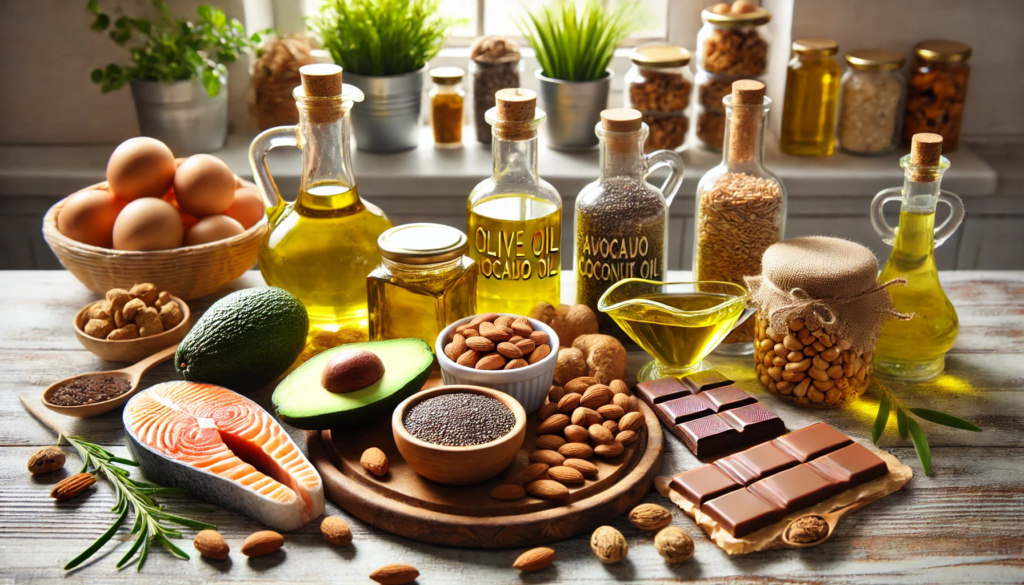
Top 20 Healthy Fats and Oils You Should Add to Your Diet
Incorporating healthy fats into your diet is essential for supporting heart health, brain function, and hormone balance. Not all fats are bad—many provide valuable nutrients that promote overall wellness. Here are the top 20 healthy fats and oils you should consider adding to your meals.
1. Olive Oil
Olive oil, especially extra virgin olive oil, is a staple of the Mediterranean diet. It’s rich in monounsaturated fats and antioxidants, which support heart health and reduce inflammation. Use olive oil for salad dressings, drizzling over cooked vegetables, or as a finishing oil.
2. Avocado Oil
Avocado oil is a nutrient-dense oil with a high smoke point, making it perfect for cooking at higher temperatures. It is loaded with monounsaturated fats and vitamin E, promoting skin health and reducing inflammation. Use it for sautéing, roasting, or as a dressing.
3. Coconut Oil
Coconut oil contains medium-chain triglycerides (MCTs), which provide quick energy and may support weight management. Its unique fatty acid profile helps boost metabolism. It’s ideal for baking, cooking, or adding to smoothies for a creamy texture.
4. Nuts: Almonds, Walnuts, and Pecans
Nuts are excellent sources of healthy fats, protein, and fiber. Walnuts, in particular, provide omega-3 fatty acids, which benefit brain health. Almonds and pecans are high in monounsaturated fats, supporting heart health. Enjoy them as snacks, or add them to salads or oatmeal.
5. Chia Seeds
Chia seeds are rich in omega-3 fatty acids, fiber, and protein. They help regulate blood sugar levels and support digestive health. Sprinkle them on yogurt, add them to smoothies, or use them in puddings for a nutritious boost.
6. Flaxseeds
Flaxseeds are another great plant-based source of omega-3 fatty acids and fiber. They support heart health, digestion, and hormone balance. Ground flaxseeds are more easily absorbed by the body; add them to smoothies, oatmeal, or baked goods.
7. Fatty Fish: Salmon, Mackerel, and Sardines
Fatty fish like salmon, mackerel, and sardines are high in omega-3 fatty acids, which help reduce inflammation and improve heart health. These fish are also good sources of high-quality protein. Aim to include fatty fish in your diet at least twice a week.
8. Dark Chocolate
Dark chocolate with a high cocoa content (70% or more) contains healthy fats and antioxidants that support heart health and improve mood. The flavonoids in dark chocolate help lower blood pressure and reduce inflammation. Enjoy it in moderation as a treat.
9. Eggs
Eggs, especially those with omega-3 enrichment, are nutrient-rich and contain healthy fats that support brain function and eye health. They are also a great source of high-quality protein. Include eggs in your diet for breakfast, in salads, or as snacks.
10. Pumpkin Seeds
Pumpkin seeds are rich in monounsaturated fats, omega-3 fatty acids, and essential minerals like magnesium. They support heart health, improve sleep quality, and promote healthy skin. Add them to salads, yogurt, or enjoy them roasted as a snack.
11. Hemp Seeds
Hemp seeds provide a good balance of omega-3 and omega-6 fatty acids, supporting heart and brain health. They also contain protein, fiber, and essential minerals. Sprinkle them on smoothies, yogurt, or oatmeal for a nutritious addition.
12. Cheese
Cheese is a good source of calcium and healthy fats, especially if you opt for full-fat versions like feta, cheddar, or Parmesan. While cheese is calorie-dense, moderate consumption provides beneficial nutrients for bone health and muscle function.
13. Ghee
Ghee, or clarified butter, is high in fat-soluble vitamins like A, D, E, and K. It has a high smoke point, making it ideal for cooking at high temperatures. Ghee contains butyrate, a fatty acid known for its anti-inflammatory properties.
14. Full-Fat Greek Yogurt
Full-fat Greek yogurt is a good source of healthy fats, protein, and probiotics that support gut health. It is lower in sugar than regular yogurt and provides a satisfying texture. Enjoy it with fruits, nuts, or seeds for a balanced snack.
15. Sesame Oil
Sesame oil is rich in antioxidants and healthy fats that support heart health. Its nutty flavor makes it great for stir-fries, marinades, or salad dressings. Look for toasted sesame oil for an even deeper flavor.
16. Peanut Butter
Peanut butter provides a mix of healthy fats and protein, making it a filling and energy-boosting food. It’s rich in monounsaturated fats that support heart health. Choose natural, unsweetened peanut butter to avoid added sugars and trans fats.
17. Cashews
Cashews contain healthy fats, protein, and essential minerals like magnesium and zinc. They support bone health, muscle function, and metabolism. Enjoy them as snacks, in stir-fries, or blended into creamy sauces or dairy-free spreads.
18. Macadamia Nut Oil
Macadamia nut oil is high in monounsaturated fats and has a mild, buttery flavor. It’s a great choice for cooking at higher temperatures or drizzling over salads. The oil is also rich in antioxidants, which support overall health.
19. Brazil Nuts
Brazil nuts are an excellent source of selenium, a mineral that supports thyroid function and immune health. They also contain healthy fats and protein. Just one or two Brazil nuts a day can provide your daily recommended intake of selenium.
20. Extra Virgin Avocado Oil
Extra virgin avocado oil is cold-pressed and retains its natural antioxidants and vitamins. It has a buttery flavor and a high smoke point, making it suitable for sautéing, grilling, or as a finishing oil for salads.
Conclusion
Incorporating these top 20 healthy fats and oils into your diet can support heart health, brain function, and overall well-being. The key is to consume a variety of fats in moderation and choose unprocessed, nutrient-dense options. Enjoy these healthy fats as part of a balanced diet for optimal health.
FAQ: Healthy Fats and Oils
1. Why are healthy fats important for the diet?
Healthy fats are essential for numerous bodily functions, including hormone production, nutrient absorption, and brain function. They also support heart health, help regulate inflammation, and provide a source of long-lasting energy. Incorporating a variety of healthy fats in your diet can improve overall health and wellness.
2. How much healthy fat should I consume daily?
The recommended daily intake of fats should be about 20-35% of your total daily calories, with most coming from unsaturated fats like those found in olive oil, avocados, nuts, and seeds. The exact amount will vary depending on your individual energy needs, but focusing on nutrient-dense, unprocessed fats is key.
3. Are all saturated fats bad for you?
Not all saturated fats are harmful. While some studies suggest that consuming too much saturated fat can increase cholesterol levels, sources like coconut oil, ghee, and dark chocolate contain beneficial compounds that support overall health when consumed in moderation. It’s important to balance saturated fats with unsaturated fats.
4. What’s the difference between saturated, monounsaturated, and polyunsaturated fats?
- Saturated fats: Typically solid at room temperature, found in animal products and some plant oils like coconut oil.
- Monounsaturated fats: Usually liquid at room temperature, found in olive oil, avocado oil, and nuts.
- Polyunsaturated fats: Found in oils like sunflower, flaxseed, and fish oils. They include essential fatty acids such as omega-3 and omega-6, which the body cannot produce on its own.
5. Can eating fats help with weight loss?
Yes, consuming healthy fats can support weight loss by promoting satiety, helping control hunger, and providing sustained energy. Including fats like nuts, seeds, avocados, and olive oil in your meals can make it easier to stick to a balanced diet and avoid overeating.
6. What’s the best oil for cooking at high temperatures?
Avocado oil, coconut oil, and ghee are good choices for high-heat cooking due to their higher smoke points. Olive oil can also be used for moderate-heat cooking, while oils like flaxseed or walnut oil are better suited for drizzling over finished dishes.











